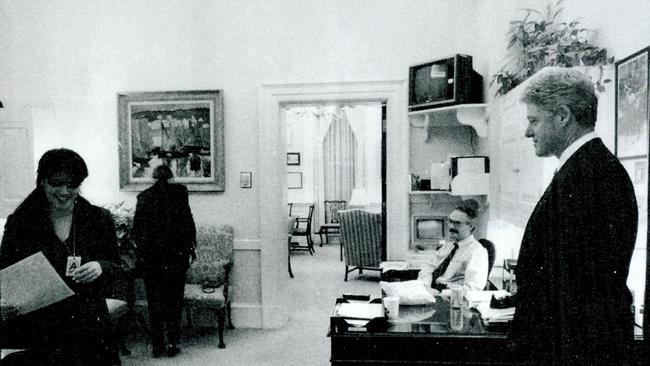Lewinsky’s drama not the true story
‘That woman’ is having her say. This may be justice, but it should not be confused with fact.

Monica Lewinsky is to produce a dramatised television series depicting her experiences at the centre of the most famous sex scandal in White House history. This is billed as the moment the former intern shapes her own version of a story that has been endlessly written and rewritten by others, both her supporters and detractors. “That woman”, as Bill Clinton famously dismissed her, is having her say.
“People have been co-opting and telling my part in this story for decades,” Lewinsky said. “In fact, it wasn’t until the past few years that I’ve been able to fully reclaim my narrative, almost 20 years later.”
The television series, Impeachment: American Crime Story, is certain to be dramatic and certainly widely watched, for the saga of the affair between the 49-year-old president and the 22-year-old intern is a parable of modern politics, tailor-made for the #MeToo moment.
But it is not history. Instead, it will be her story.
The modern “true story”, whether in the form of narrative non-fiction writing or screen drama, is usually based on a combination of memory and recorded fact: the latter reliable, checkable and immutable, and the former anything but. For it is a strange facet of human memory that those closest to events are often their least reliable narrators.
When individuals recall the past in ways that do not correspond with objective reality, they are not lying. They are merely filtering distant experience through time, making sense of what has happened to them, often framing the past as they would like it to have been, or prefer to recall it. Memory is malleable, in ways that are frequently unconscious. This is not deceit, or even self-deception, but a form of protective remembering.
Lewinsky is said to be “wresting power” over a story that has too often been commandeered by others for political purposes. But while it is important that her voice is finally heard, that does not necessarily make the result any more accurate than any other form of autobiography or, for that matter, authorised biography (a dubious genre). Having Lewinsky produce her own drama is only true in the sense that it will be her truth.

Writing the authorised history of the SAS, I was repeatedly struck by the frequency with which the memories of those involved departed from the verifiable record. David Stirling, for example, the founder of the unit, often described how, on crutches after a parachuting accident in 1941, he had broken into a military compound in Cairo in order to beard General Auchinleck, commander of Middle Eastern Forces, and ensure the survival of his fledgling force. Stirling told and retold this story, wrote it up in various versions, until eventually it achieved the patina of absolute truth, picked up by his comrades in arms, repeated and embellished.
But there is nothing in the official record of the regiment to show this episode actually took place, and plenty to suggest it did not. Auchinleck had been grouse-shooting on the Stirlings’ Scottish estate - a more likely explanation of why the young lieutenant got to see him, but a less entertaining after-dinner story. Stirling was not lying. The story had a kernel of truth that slowly evolved into fact, and then became embedded. He would have sworn blind it happened, and believed himself.
Everyone does this. Anyone with a sibling will know the experience of hearing a shared past recounted in a way that we do not recognise. In many cases, the more dramatic or memorable the moment, the more contrasting the memories are likely to be.
No fewer than ten British intelligence officers took part in the 1985 exfiltration from Moscow of the KGB spy Oleg Gordievsky. Each recollection was subtly different and some were irreconcilable with each other. Gordievsky’s own memory of events, in a few cases, departed from the evidence. His unique value as a source on his own life lay in his willingness to acknowledge when his own memories were fallible.
Telling a true story that lies within living memory requires assembling the widest possible body of oral evidence, setting that against the record and establishing, as closely as possible, what happened and what it meant. That is even harder with screen drama, with all its additional requirements for emotional pacing, swift character delineation and suspense.
The ideal way to tell the Lewinsky saga would be to assemble the perspectives and memories of all those involved. To recruit not only her as a producer, but also the other actors, including the Clintons, the investigator Ken Starr and Linda Tripp, the civil servant who secretly recorded her telephone conversations with Lewinsky. Then set each of these accounts against what Donald Rumsfeld called the “known knowns”. This is not going to happen. The makers of Impeachment have said that they will not be “reaching out” to Bill and Hillary Clinton for their input.
The series will be, in effect, a new species of television: the authored TV drama, the on-screen version of a life scripted, to some extent, by the person who lived it.
Salman Rushdie drew an important distinction between memoir and autobiography, the two strands of written recollection: “Memoir is there primarily to tell one particular story, whereas an autobiography tries to be a full account of a life.”
For years Lewinsky was presented as a vamp or a victim. She has already made her voice heard in print and interviews; now she will be heard through the powerful medium of rolling drama. This may be justice, but it should not be confused with fact.
Impeachment breaks new historical ground, as the first self-dramatised television memoir.



To join the conversation, please log in. Don't have an account? Register
Join the conversation, you are commenting as Logout